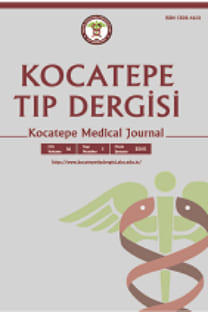Yirmi Haftalık Gebelikte Adneksiyal Kitle Torsiyonu: Olgu Sunumu
Gebelik; ovaryan kitle; torsiyon
Yirmi Haftalık Gebelikte Adneksiyal Kitle Torsiyonu: Olgu Sunumu
Pregnancy; ovarian mass; torsion,
___
- Hill LM, Conners-Beatty DJ, Nowak A, Trush B. The role of
- ultrasonography in the detection and management of
- adnexal masses during the second and third trimester of
- pregnancy. Am J Obstet Gynecol 1998;179(3 Pt 1):703–7.
- Schmeler KM, Mayo-Smith WW, Peipert JF, Weitzen
- S, Manuel MD, Gordinier ME. Adnexal masses in
- pregnancy: surgery compared with observation. Obstet Gynecol 2005;105(5 Pt 1):1098-103.
- Whitecar MP, Turner S, Higby MK. Adnexal masses in pregnancy: a review of 130 cases undergoing surgical management. Am J Obstet Gynecol 1999;181(1):19–24.
- Sherard GB 3rd, Hodson CA, Williams HJ, Semer DA, Had, HA, Tait DL. Adnexal masses and pregnancy: 12-year experience. Am J Obstet Gynecol 2003;189(2):358-62.
- Platek DN, Henderson CE, Goldberg GL. Management of a persisitent adnexal mass in pregnancy. Am J Obstet Gynecol 1995;173(4):1236–40.
- Martin JR, Martin RW, Morrison JC. Surgical diseaes and disorders in pregnancy. In: Pernoll ML (Editor). Current obstetric and gynecologic diagnsis and treatment. 7th Edition, Connecticut: Appleton and Lange, 1991:480–92.
- Niswander KR, Evans AT (Editors). Manual of obstetrics. In: Leisrowitz GS. Surgicall complications during pregnancy. 5th Edition, Boston: Little Brown and Company, 1996:239– 60.
- Visser BC, Glascow RE, Mulvihill KK, Mulvihill SJ. Safety and timing of nonobstetric abdominal surgery in pregnancy. Dig Surg 2001;18(5):409–17.
- Mathevet P, Nessah K, Dargent D, Mellier G. Laparoscopic management of adnexal masses in pregnancy: a case series. Eur J Obstet Gynecol Reprod Biol 2003;108(2):217-22.
- Türkçüoğlu I, Meydanli MM, Engin-Ustün Y, Ustün Y, Kafkasli A. Evaluation of histopathological features and pregnancy outcomes of pregnancy associated adnexal masses. J Obstet Gynaecol 2009;29(2):107-9.
- ISSN: 1302-4612
- Yayın Aralığı: Yılda 4 Sayı
- Başlangıç: 1999
Serebellar İnfarktlarda Risk Faktörleri ve Klinik Özellikler
Tuba ÖZCAN AYDEMİR, Aytül MUTLU, Feriha ÖZER, Sefer GÜNAYDIN, Belgin BALCI PETEK, Hürtan ACAR, Özlem ÇOKAR
Alprazolam Kullanımına Bağlı Anksiyete Artışı
Yirmi Haftalık Gebelikte Adneksiyal Kitle Torsiyonu: Olgu Sunumu
Ahmet UYSAL, Semih MUN, Cüneyt Eftal TANER, Fatma UYSAL
Koroner Arter Hastalarında Hipertansiyonun İnflamatuar Reaksiyona Additif Etkisi
Lomber Disk Hernisi ve Benign Eklem Hipermobilite Sendromu
Kemal KARAAĞAÇ, Özlem ARICAN ÖZLÜK, Mustafa YILMAZ, Burhan ASLAN, Dursun TOPAL
Kemal KARAAĞAÇ, Özlem ÖZLÜK ARICAN, Mustafa YILMAZ, BURHAN ASLAN, Dursun TOPAL
Koroner Arter Hastalığı ile Karotis İntima-Media Kalınlığı Arasındaki İlişkinin Değerlendirilmesi
Leyla TURGUT, Elif ERGÜN, NEŞE ASAL, Ömer YILMAZ, Aynur TURAN, Uğur KOŞAR
Meme Kanser Cerrahisinde Torakal Paravertebral Blok Sonrasi Gelişen Epidural Yayilim: Olgu Sunumu
